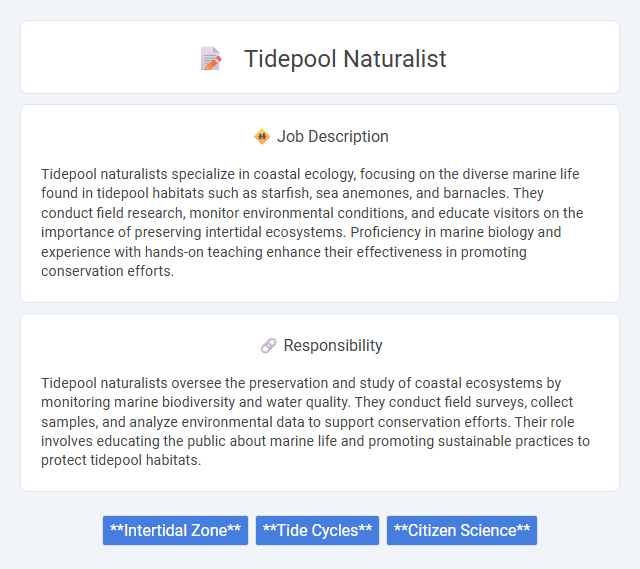
Tidepool naturalists specialize in coastal ecology, focusing on the diverse marine life found in tidepool habitats such as starfish, sea anemones, and barnacles. They conduct field research, monitor environmental conditions, and educate visitors on the importance of preserving intertidal ecosystems. Proficiency in marine biology and experience with hands-on teaching enhance their effectiveness in promoting conservation efforts.
Individuals with a passion for marine ecosystems and strong observational skills are likely to thrive as Tidepool naturalists, as the role often involves guiding visitors through diverse marine habitats and explaining ecological interactions. Those comfortable with outdoor, sometimes physically demanding environments and adept at communicating scientific knowledge in an accessible way may find this position suitable. Conversely, candidates who prefer sedentary work or lack interest in environmental education might encounter challenges adapting to the dynamic and interactive nature of this job.
Qualification
Candidates for the Tidepool naturalist position must possess a strong background in marine biology, ecology, or environmental science, often demonstrated by a bachelor's degree or higher. Essential qualifications include experience with tidepool ecosystems, proficiency in species identification, and knowledge of intertidal zone dynamics. Strong communication skills are critical for leading educational tours and engaging with the public about marine conservation.
Responsibility
Tidepool naturalists oversee the preservation and study of coastal ecosystems by monitoring marine biodiversity and water quality. They conduct field surveys, collect samples, and analyze environmental data to support conservation efforts. Their role involves educating the public about marine life and promoting sustainable practices to protect tidepool habitats.
Benefit
A Tidepool naturalist role likely offers the benefit of hands-on experience with marine ecosystems, enhancing understanding of biodiversity and conservation efforts. This position probably provides opportunities for community education and engagement, fostering environmental stewardship. Employees may also enjoy working in dynamic coastal environments, which can support both professional growth and personal fulfillment.
Challenge
Tidepool naturalist roles likely involve navigating the unpredictable conditions of coastal ecosystems, requiring adaptability and keen observational skills. Challenges may include engaging diverse audiences while ensuring safety around slippery rocks and tidal changes. Strong knowledge of marine life behavior is probably essential to effectively interpret and communicate the dynamic environment.
Career Advancement
Tidepool naturalist roles offer extensive opportunities for career advancement through specialized training in marine biology, ecology, and environmental education. Professionals gain hands-on experience with tidal ecosystems, enhancing expertise in field research and species identification, which are critical for leadership positions in conservation and environmental management. Progression often leads to roles such as senior naturalist, program coordinator, or environmental consultant within nonprofit organizations and governmental agencies.
Key Terms
Intertidal Zone
Tidepool naturalists specialize in the intertidal zone, a dynamic ecosystem located between the high and low tide marks where marine and terrestrial environments intersect. They study the unique adaptations of organisms such as sea stars, anemones, and barnacles that withstand fluctuating conditions like salinity, temperature, and wave action. Their role involves educating the public on the ecological importance of this habitat, monitoring biodiversity, and promoting conservation efforts to protect these fragile coastal communities.
Tide Cycles
Tidepool naturalists specialize in monitoring and interpreting tide cycles, which dictate the exposure and submersion of intertidal zones critical to marine ecosystems. Understanding the precise timing and amplitude of high and low tides allows naturalists to predict species behavior and guide educational programs about biodiversity. Their expertise in tide cycles supports conservation efforts by highlighting patterns essential for habitat preservation and species survival.
Citizen Science
Tidepool naturalist roles emphasize citizen science by engaging local communities in marine ecosystem monitoring and data collection. Volunteers contribute real-time observations of tidal life, enhancing scientific research through accessible digital platforms. This collaborative approach advances biodiversity understanding and supports conservation efforts in coastal environments.
 kuljobs.com
kuljobs.com